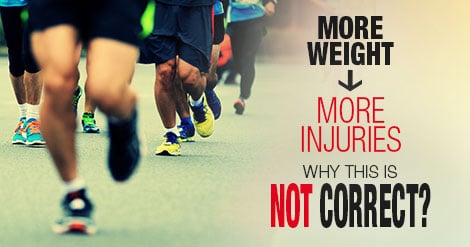Are you a big-boned runner? Do you sometimes compete in “Clydesdale” or “Athena” divisions in road races? You would destroy the competition if you could find them at every event.
If so, injury risk may be a concern you have. It is often said that runners who weigh more are at a higher risk of injury. Today we will be looking to the scientific literature to see if there’s any truth to that statement.
While there are a lot of plausible theoretical reasons why a heavier runner might incur more overuse injuries—higher impact forces perhaps, or greater pressure per square inch on the bottom of the foot—things aren’t always as they seem when it comes to injuries, so we want to go right to the research.

More Weight= More Injuries?
When we look at something as basic and as easy to measure as weight, it is much easier to conduct a large-scale study with strong statistical evidence behind its findings.
The first such study we’re going to look at was published in 2002 by Jack Taunton and other researchers at the University of British Columbia in Canada.
Taunton and colleagues looked at the incidence of running injuries among over two thousand runners who were treated at a Canadian sports medicine center over a two-year period.1
After gathering data on training history, height, weight, age, and a number of other variables, the researchers were able to run a statistical analysis to see which factors predicted injuries.
Weight was measured using Body Mass Index (BMI), which takes both height and weight into account.
The only relationship identified was an increased risk of stress fractures in women who had a BMI less than 21—heavier runners incurred no more injuries than their lighter counterparts!
Taunton et al. hypothesized that the lighter-weight women were more likely to have abnormal menstruation and more fragile bones, predisposing them to stress fractures.
Less Weight= More Injuries?
Even more interesting is a 2003 study by the same group of researchers which used a prospective design.
Taunton et al. followed 844 recreational runners during their training for a ten kilometer road race, again measuring variables like height, weight, age, and other variables. They looked for correlations with which runners suffered injury during their thirteen-week training program.2
Again, heavier runners did not have a greater risk of injury; in fact, men whose BMI was greater than 26 actually had a lower risk of injury.
Taunton et al. also cite two other studies which found no correlation between BMI and running injury rates.
However, one study did associate greater weight with a higher risk of injury. A 1981 study by Bernard Marti and other researchers at the University of Bern in Switzerland studied over 4,000 male runners participating in a 10-mile race.3
They found that men who had a BMI greater than 27 or lower than 19.5 had an increased risk of injury, though they cautioned that the number of runners in these categories was quite small.
Conclusion
On balance, the scientific research appears to show that being overweight is not associated with a higher injury risk.
Why might this be?
A 2007 review article by researchers in the Netherlands points out that heavier runners are likely to run slower and shorter distances than lighter ones, which could create some degree of self-limitation.4
It is well-known that carrying extra weight slows you down when you run, and slower speeds do mean less force in your legs.
It’s also possible that your body is equally adapted to carry its own weight no matter if you’re big-boned or rail-thin.
One unanswered question, though is whether the same runner who gains weight increases his or her injury risk over time. Finding an answer to this will call for better-designed studies which follow a group of runners over the course of several years.
Regardless, though heavier runners are held back by issues like heat regulation and carbohydrate reserves in distance races, their risk of injury doesn’t seem to be any greater.
If you’ve put on a few pounds since your college days, or if you’re started running as a way to lose weight, you can take some comfort knowing that you’re in the same boat as everybody else when it comes to injuries.
If you want to read more about how weight affects you, check out our post on How Much Does Excess Weight Impact Your Running Performance.
Has your injury rate changed based on losing or gaining weight?








